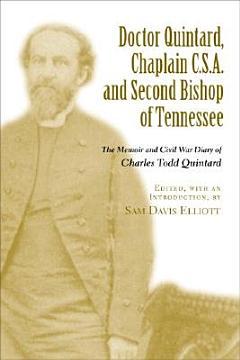Trained as a physician and ordained an Episcopal priest, Charles Todd Quintard (1824--1898) was a remarkable man by the standard of any generation. Born, raised, and educated in the North, he migrated to the South to pursue a medical career but was inspired by the bishop of Tennessee to serve the church. When Tennessee seceded from the Union in May 1861, Quintard joined the Confederate 1st Tennessee Infantry Regiment as its chaplain and during the maelstrom of the Civil War kept a diary of his experiences. He later penned a memoir, which was published posthumously in 1905.
Sam Davis Elliott combines a previously unpublished portion of the diary with Quintard's memoir in Doctor Quintard, Chaplain C.S.A. and Second Bishop of Tennessee. Quintard offers an unusual perspective and insightful observations gained from ministering to soldiers and civilians as both a priest and a physician. With thoughtful editing and annotating, Quintard's writings provide a valuable window into the high command of the Army of Tennessee at some of its more critical junctures and substantial detail of the last eight months of the war in Tennessee, Mississippi, Alabama, and Georgia.
Quintard was present during the early fighting in Virginia, marched into Kentucky with Braxton Bragg, attended to the wounded at Murfreesboro and Chickamauga, witnessed two Confederate retreats from Middle Tennessee, and watched the Federal armies overrun the Deep South in the spring of 1865. He met such diverse personages as Robert E. Lee and Federal Major General James H. Wilson; prayed with Bragg, Leonidas Polk, and John Bell Hood; shared a bed once with Nathan Bedford Forrest; and performed the sad duty of conducting the funerals of Patrick Cleburne and others killed at Franklin, Tennessee. Throughout his military service, he organized hospitals and relief efforts, filled in as a parish priest, and served as chaplain at large of the Army of Tennessee.
After the war, Quintard became the prime mover in the revival of Leonidas Polk's dream of an Episcopal Church--sponsored University of the South, and in 1865 he was consecrated bishop of Tennessee, a position he held until his death. These interesting and lively war-year remembrances of one of the Confederacy's most exceptional characters shed new light on the little-known western theater's military, civilian, and religious fronts.
The Memoir and Civil War Diary of Charles Todd Quintard

